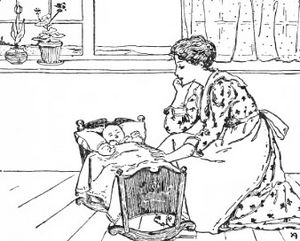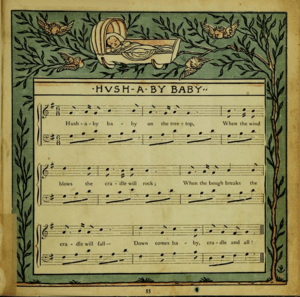Rock-a-bye Baby facts for kids
Quick facts for kids "Rock-a-bye Baby" |
|
|---|---|
 |
|
| Nursery rhyme | |
| Published | c. 1765 |
"Rock-a-bye Baby" is a nursery rhyme and lullaby. It has a Roud Folk Song Index number of 2768.
Lyrics
The first printed version from Mother Goose's Melody (London, c. 1765), has the following lyrics:
- Rock-a-bye baby
- in the tree top.
- When the wind blows
- the cradle will rock.
- When the bough breaks,
- the cradle will fall.
- And down will come Baby,
- Cradle and all.
The version from Mother Goose's Melody or Sonnets for the Cradle (London, 1791) contains the wording:
- Hush-a-bye baby
- on the tree top...
The version from Songs for the Nursery (London, 1805), contains the wording:
- Rock-a-bye baby, thy cradle is green,
- Father's a nobleman, mother's a queen
- And Betty's a lady, and wears a gold ring;
- And Johnny's a drummer, and drums for the king
Alternate Lyrics as shown in The Real Mother Goose (Rand McNally & Co., Chicago) published in 1916:
- Rock-a-bye baby, thy cradle is green;
- Father's a nobleman, mother's a queen;
- And Aggy's a lady, and wears a gold ring;
- And Johnny's a drummer, and drums for the king.
The most common version used today is:
- Rock-a-bye baby, on the tree tops,
- When the wind blows, the cradle will rock,
- When the bough breaks, the cradle will fall,
- And down will come baby, cradle and all.
The 'full' version's lyrics are:
- Rock-a-bye baby, on the tree top
- When the wind blows the cradle will rock
- If the bough breaks, the cradle will fall
- Mother will catch you, cradle and all
- Baby is drowsing, cosy and fair
- Mother sits near in her rocking chair
- Forward and back, the cradle she swings
- Though baby sleeps, he hears what she sings
- “Rock-a-bye baby, do not you fear
- Never mind, baby, mother is near
- Wee little fingers, eyes are shut tight
- Now sound asleep until morning light”
Another alternative is:
- Rock-a-bye baby, in the treetop
- When the wind blows, the cradle will rock.
- Softly you sway and softly you sleep,
- And drift into Dreamland, sweet and deep.
Publication
The words first appeared in print in Mother Goose's Melody (London, c. 1765), possibly published by John Newbery (1713–1767), and which was reprinted in Boston in 1785. Rock-a-bye as a phrase was first recorded in 1805 in Benjamin Tabart's Songs for the Nursery, (London, 1805).
Melody
It is unclear though whether these early rhymes were sung to either of the now-familiar tunes. At some time, however, the Lillibulero-based tune and the 1796 lyric, with the word "Hush-a-bye" replaced by "Rock-a-bye", must have come together and achieved a new popularity. A possible reference to this re-emergence is in an advertisement in The Times newspaper in 1887 for a performance in London by a minstrel group featuring a "new" American song called 'Rock-a-bye': "Moore and Burgess Minstrels, St James's-hall TODAY at 3, TONIGHT at 8, when the following new and charming songs will be sung...The great American song of ROCK-A-BYE..."
This minstrel song, whether substantially the same as the nursery rhymes quoted above or not, was clearly an instant hit: a later advertisement for the same company in the paper's November 8 edition promises that "The new and charming American ballad, called ROCK-A-BYE, which has achieved an extraordinary degree of popularity in all the cities of America will be SUNG at every performance."
If this is, in fact, the same song, then this implies that it was an American composition and already popular there. An article in the New York Times of August 1891 (p. 1) refers to the tune being played in a parade in Asbury Park, N.J. and clearly by this date the song was well established in America. Newspapers of the period, however, credit its composition to two separate persons, both resident in Boston: one is Effie Canning (later referred to as Mrs. Effie D. Canning Carlton and the other the composer Charles Dupee Blake.
The melody also has echoes of the opening of Max Reger's variations on a theme by Mozart, Opus 132.


